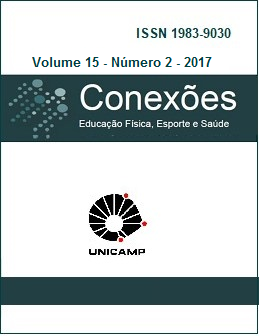Resumen
Independente de nossas origens e contextos culturais, a música apresenta papel fundamental em nossas vidas. A música é capaz de alterações psicofisiológicas com aplicações no esporte e exercício. O objetivo do presente estudo é revisar o conhecimento científico a respeito da possível influência da música no esporte e exercício. Selecionamos artigos presentes na base de dados Physical Education Index, publicados entre os anos 2010 e 2015 e que foram revisados por especialistas. Foram excluídos aqueles que não tratavam do tema da presente pesquisa, assim analisamos 13 artigos. De acordo com os estudos revisados, a música parece beneficiar de forma aguda os exercícios físicos de caráter aeróbio, diferentemente dos exercícios anaeróbios, o que se deve provavelmente à alta intensidade. Apesar disso, sua eficácia para a aplicação no esporte, sobretudo no de alto rendimento ainda não está completamente clara.
Citas
ATAN, Tugba. Effect of music on anaerobic exercise performance. Biology of Sport, v. 30, n. 1, p. 35-39, 2013.
BERNARDI, Luciano; PORTA, Camillo; SLEIGHT, Peter. Cardiovascular, cerebrovascular, and respiratory changes induced by different types of music in musicians and non-musicians: the importance of silence. Heart, London, v. 92, n. 4, p. 445-452, 2006.
BIGLIASSI, Marcelo et al. How does music aid 5 km of running? Journal of Strength Conditioning Research, Colorado Springs, v. 29, n. 2, p. 305-314, 2015.
BROOKS, Kelly; BROOKS, Kristal. Difference in wingate power output in response to music as motivation. Journal of Exercise Physiology Online, v. 13, n. p. 14-20, 2010. Disponível em: https://www.asep.org/asep/asep/JEPonlineDec2010Brooks.docx+&cd=1&hl=pt-BR&ct=clnk&gl=br. Acesso em: 26 fev. 2016.
CARNEIRO, João Guilherme et al. Música: recurso ergogênico psicológico durante o exercício físico?. Revista Brasileira de Psicologia do Esporte, Brasília, v. 3, n. 2, p. 61-70, 2010.
CHATTERJEE, Saikot; GHOSH, Madhab Chandra; GHOSH, Arnab. A study to explore the effects of varied tempo music on brisk walking performance. Journal of Sports and Physical Education, v. 1, n. 7, p. 43-46, nov./dec. 2014.
GHADERI, Mohammad et al. Influence of music type listening on anaerobic performance and salivary cortisol in males athletes. British Journal of Sports Medicine, Loughborough, v. 44, n. 1, p. 162-167, 2010. Disponível em: https://www.researchgate.net/publication/254744599_The_effect_of_fast_and_slow_rhythm_music_on_anaerobic_performance_and_salivary_cortisol_in_athlete_males. Acesso em: 26 fev. 2016.
JACOB, Stanley W.; FRANCONE, Clarice Ashworth; LOSSOW, Walter J. Anatomia e fisiologia humana. 5. ed. Rio de Janeiro: Guanabara,1990. p. 278-299.
KARAGEORGHIS, Costas I.; TERRY, Peter C. The psychological, psychophysical and ergogenic effects of music in sport: a review and synthesis. In: BATEMAN, A. J.; BALE, J. R. (Ed.). Sporting sounds: relationships between sport and music. London: Routledge, 2009. p. 13-36. Disponível em: http://bura.brunel.ac.uk/bitstream/2438/6700/2/FullText.pdf. Acesso em: fev. 2016.
KARAGEORGHIS, Costas I. TERRY, Peter C.; LANE, Andrew. Development and initial validation of an instrument to assess the motivational qualities of music in exercise and sport: the brunel music rating inventory. Journal of Sports Sciences, London, v. 17, n. 9, p. 713-724, 1999.
KARAGEORGHIS, Costas I. et al. Ergogenic and psychological effects of synchronous music during circuit-type exercise. Psychology of Sport and Exercise, Netherlands, v. 11, n. 6, p. 551-559, 2010.
KARAGEORGHIS, Costas I. et al. Revisiting the relationship between exercise heart rate and music tempo preference. Research Quarterly for Exercise and Sport, Reston, v. 82, n. 2, p. 274-284, 2011.
LANE, Andrew M.; DAVIS, Paul A.; DEVONPOR, Tracey J. Effects of music interventions on emotional states and running performance. Journal of Sports Science and Medicine, Bursa, v. 10, n. 2, p. 400-407, 2011.
LAUKKA, Petri; QUICK, Lina. Emotional and motivational uses of music in sports and exercise: A questionnaire study among athletes. Psychology of Music, London, v. 41, n. 2, p. 198-215, 2011.
MINDLIN, Galina; DUROUSSEAU, Don; CARDILLO, Joseph. Sua playlist pode mudar sua vida. Rio de Janeiro: BestSeller, 2014.
MIRANDA, Maria Luiza de Jesus; GODELI, Maria Regina C. Souza. Música, atividade e bem-estar psicológico em idosos. Revista Brasileira de Ciência e Movimento, Brasília, v. 11, n. 4, p. 87-94, 2003.
MUSZKAT, Mauro. Música, neurociência e desenvolvimento humano. In: BRASIL. Ministério da Cultura. A música na escola. Brasília, 2012. p. 67-71. Disponível em: http://www.amusicanaescola.com.br/. Acesso em: 26 fev. 2016.
PRIEST, David Lee; KARAGEORGHIS, Costas I.; SHARP, N. C. Craig. The characteristics and effects of motivational music in exercise settings: the possible influence of gender, age, frequency of attendance and time of attendance. Journal of Sports Medicine and Physical Fitness, Torino, v. 44, n. 1, p. 77-86, 2004.
SILVA, João P. Lopes et al. Influence of music on performance and psychophysiological responses during moderate-intensity exercise preceded by fatigue. Physiology and Behavior, Elmsford, v. 139, p. 274-280, 2015.
SOUZA, Yonel Ricardo; SILVA, Eduardo Ramos. Efeitos psicofísicos da música no exercício: uma revisão. Revista Brasileira de Psicologia do Esporte, Brasília, v. 3, n. 2, p. 33-45, 2010.
SOUZA, Yonel Ricardo; SILVA, Eduardo Ramos. Temporal analysis of the ergogenic effect of asynchronous music on exercise. Revista Brasileira de Cineantropometria e Desempenho Humano, Florianópolis, v. 14, n. 3, p. 305-312, 2012.
TERRY, Peter C.; KARAGEORGHIS, Costas I. Psychophysical effects of music in sport and exercise: an update on theory, research and application. In: KATSIKITIS, M. Psychology bridging the Tasman: science, culture and practice. Melbourne: Australian Psychological Society, 2006. Disponível em: https://www.piuvivi.com/docs/effetti-musica-sulla-psiche.pdf. Acesso em: 26 fev. 2016.
TERRY, Peter C. et al. Effects of synchronous music on treadmill running among elite triathletes. Journal of Science and Medicine in Sport, Belconnen, v. 15, n. 1, p. 52-57, 2012.
WATERHOUSE, Jim; HUDSON, Pollyana; EDWARDS, Ben. Effects of music tempo upon submaximal cycling performance. Scandinavian Journal of Medicine and Science in Sports, v. 20, n. 4, p. 662-669, 2010.
YAMASHITA, Saori et al. Effects of music during exercise on RPE, heart rate and the autonomic nervous system. Journal of Sports Medicine and Physical Fitness, Turin, v. 43, n. 3, p. 425-430, 2006.
YEATS, Jeremy et al. High school volleyball athletes: perceptions of creating and using pre-competition warm-up music. Sport Science Review, Champaign, v. 23, n. 3/4, p. 127-150, 2014.
O periódico Conexões: Educação Física, Esporte e Saúde utiliza a licença do Creative Commons (CC), preservando assim, a integridade dos artigos em ambiente de acesso aberto.


